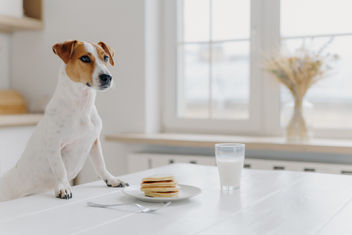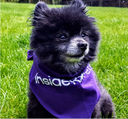Toxic Foods for Dogs: What to Avoid
December 14, 2021Owning a dog comes with a number of challenges including ensuring they remain in good health. Feeding your dog the right foods, and avoiding the wrong ones, is key to keeping them healthy. To be sure you don’t feed your furry friend anything they can’t have, we’ve put together a (beginner) list of toxic foods for dogs.

The Inside Rx Blog
Get the Inside Scoop on tips & tricks that may help your family save on prescriptions!
Subscribe to stay up to date with the latest news and tips
To spare your pet any potential health problems, we’ll cover some of the most harmful foods for dogs—though this list is by no means exhaustive. There may be other household foods and items that you shouldn’t feed your dog, so consult with your veterinarian before sharing any of your favorite foods with Fido.
What are toxic foods for dogs?
It may seem perfectly benign to you, but food as common as grapes possess compounds that act as natural toxins to dogs.
Given this fact, it’s necessary to resist the urge to share your table scraps, even when you’ve got a plateful of food and your pooch is licking his chops, patiently waiting on your generosity.
But just like you wouldn’t give a 6-month-old baby hard candy, the most loving thing to do is forgo giving your furry friend any of the foods on our list.
Onions, Garlic, Chives
Onions, garlic, and chives all belong to the same family. You should not give your dog any of these vegetables, whether fresh or cooked. Doing so can lead to a serious drop in red blood cells, leading to ruptures. In some cases, ingestion of chives can be fatal.
Some symptoms may be weakness, lethargy, bad breath, vomiting, diarrhea, and seizures.
Allium vegetables
This family of vegetables poses a higher risk to cats but are still toxic to dogs. Ingestion of onions, shallots, chives, scallions, or garlic can damage your dog’s red blood cells, leading to anemia.
If you notice pale or white gums, lethargy, weakness, dark urine, and lack of appetite, your dog may be suffering from anemia.
Grapes
Grapes are one of those foods that are beneficial for humans but toxic for your furry companion.
When it comes to your dog, all fruits and related products from the grapevine should be avoided. Though the physical mechanism is poorly understood, grapes and raisins can lead to kidney failure in canines.
Symptoms to look out for include rapid panting, trouble breathing, dry nose and mouth, and pale gums.
Macadamia nuts
Macadamia nuts are not healthy for dogs. The reason nuts are such a problem is that they contain tremorgenic mycotoxins that can trigger seizures in dogs.
Macadamia nuts, in particular, are consistently listed as among one of the top foods to avoid giving your dog. If your pooch happens to ingest these nuts, it may lead to vomiting, ataxia, weakness, and hyperthermia.
Avocados
Avocado leaves, fruit, seeds and bark possess a toxin known as persin. Unfortunately, the common type found in grocery stores, usually the Guatemalan variety, appears to be the most harmful for dogs.
Avocado ingestion can cause stomach upset in some dogs. The pit is the biggest worry since it can cause an obstruction if ingested.
Symptoms to look out for are diarrhea, vomiting, nausea, or weakness.
Coffee, chocolate, and caffeine-containing foods
You’ve likely heard that chocolate is bad for dogs, and indeed it’s true. Although delicious, both chocolate and caffeine contain substances called methylxanthines, which are poisonous to dogs.
Methylxanthines can cause vomiting, diarrhea, elevated body temperature, and tremors. The severity of symptoms is influenced by the quantity and kind of chocolate ingested.
Foods containing xylitol
Xylitol is safe for use in people and can be found in many products as a sugar substitute; however, xylitol is extremely toxic to dogs.
When dogs eat foods with xylitol, the substance is quickly absorbed into the bloodstream, producing a potent release of insulin from the pancreas. Due to a dog’s sensitivity to the compound, even small amounts of xylitol can cause hypoglycemia (low blood sugar), seizures, liver shutdown, or even death.
Beer and alcohol
It should come as no surprise that alcohol can be hazardous for dogs. Just as with people, consuming alcohol can lead to poisoning. However, unlike humans, dog livers aren’t capable of processing alcohol, making them far more susceptible to liver damage or alcohol poisoning.
Symptoms of alcohol consumption in dogs are rapid breathing, increased heart rate, high body temperature, vomiting, and tremors.
Pantoprazole Sodium
$ 8.04Bupropion Hcl
$ 10.00Inside Rx is here for your pets
The best way to keep your pet healthy and safe is to ensure they’re getting the care they deserve. That doesn’t just mean avoiding toxic foods. Your pet may also be taking medications or supplements as recommended by their veterinarian, which can be expensive. If you’re looking for ways to save on pet medications, Inside Rx Pets is here to help you save.
If you don’t have pet insurance, you can use an Inside Rx Pets savings card. Use the integrated search tool from Inside Rx to find your pet’s medication as a generic or brand-name drug. Most people find they save up to 75% on generic pet medications. Try Inside Rx Pets today and compare prices at different pharmacies nearest to you!



